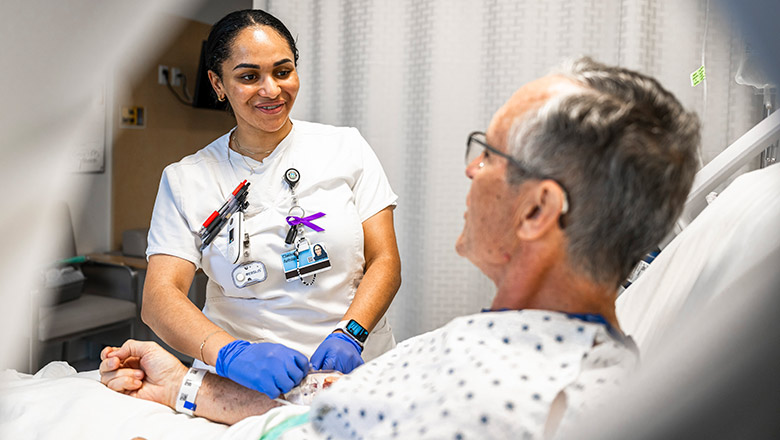
Your Hospital Stay
That’s perfectly normal. But when you trust Cleveland Clinic with your care, you’ll have experienced and compassionate healthcare providers on your side.
Our team is committed to providing you with the highest quality healthcare experience. And we’re also dedicated to ensuring you get treatment in a safe, comfortable environment — whether you’re here for observation or a lengthier stay.
Observation Care vs. Being Admitted to the Hospital
You may stay only a night or two for observation care. Or perhaps you’ve been admitted for a longer visit. Wondering how the number of nights was determined?
Our team chooses between observation and hospital admission by considering the level of care you need, the severity of your condition and how long we think you may need to stay in the hospital. Your health insurance company also guides some of these decisions, as these two types of stays are billed differently.
Observation care
You may come for observation care when you have a health problem we can evaluate and treat quickly. If you’re staying with us for observation, it means a few things:
- Your care team needs time to decide if you require a longer hospital stay or can leave (be discharged) sooner.
- You aren’t officially admitted to the hospital but will stay with us for 48 hours or less.
- We keep a close eye on your condition to see how it progresses.
We’ll make sure we talk to you about follow-up testing, treatments and appointments you may need after you leave the hospital.
Hospital admission
If we admit you to the hospital, you’ll receive what we refer to as inpatient care. It’s typically more complex and involves a longer stay compared to observation. We may admit you if:
- Observation care indicates you need further treatment
- You’ve had a complex surgery or are dealing with a severe illness
- You require constant medical supervision for another reason
What To Know While You’re Here With Us

Whether you’re staying with us for observation or as an admitted patient, you can count on receiving high-level care. It’s your right and an integral part of Cleveland Clinic’s patient-first approach. That’s why we’re here to help you understand every part of your stay, starting with the basics.
Your room
You’ll spend most of your time in your room, so we’ve equipped it to be as comfortable and convenient as possible. Many of our rooms are semi-private, so you may have a roommate. Your room will have a curtain between the beds that you can pull for privacy.
Your room has an adjustable bed, landline phone, a TV remote with a built-in speaker and a call button.
Your call button lets your care team know you need help. This isn’t only for emergencies. You can press it if you need help with things like:
- Getting to the bathroom
- Using a bedpan
- Adjusting your bed
- Getting water
Your room will also have Wi-Fi access, but if you’re listening to music or watching a movie on your personal device, we recommend you use headphones. We also offer headphones for the TV remote.
Your care plan
You’re not alone in this journey. You’ll have a care management team working alongside your medical care team. This may include nurses, social workers or case managers who can help guide you through your treatment plan. They’re also here to answer questions and listen to your concerns.
Your care team will check in on you regularly during what we call, “hourly rounding.” This is when we:
- Make sure you’re comfortable and not in any pain
- Help you change your position or move between the bed and chair
- Assist you with using the bathroom
Don’t hesitate to ask questions whenever a team member is in your room. If you’re not feeling up to communicating, it might be helpful to have a trusted loved one act as your spokesperson for you during your stay.
Your care team will also participate in “bedside reporting.” This occurs during your nurses’ shift changes. They’ll talk with you and your loved ones about your condition.
Medications
Your hospital care team may prescribe medications as part of your treatment plan. Feel free to ask questions to learn why you’re taking them, what they do and how long you’ll need them.
You’ll also want to let your care team know about any medications you regularly take, including prescription and over-the-counter drugs and vitamin and herbal supplements.
Pain management
While we can’t always eliminate your pain, you also don’t have to live with it or ignore it. If something won’t stop hurting, say something. It’s important to tell us when your pain becomes a problem. Medications can often help keep it from getting worse.
We want to help you reach a comfort level with medication that’s best for you. To do this, we’ll ask you questions about your pain level. We may also use other types of pain relief, including heat, ice, repositioning and massage.
Visitors, quiet hours
Cleveland Clinic offers 24/7 visiting hours so you can have round-the-clock support from loved ones if needed. Please remind family and friends who visit to keep the noise level down. Even if you don’t have a roommate, other people staying with us may be sleeping.
Our quiet hours follow HUSH (Help Us Support Healing) guidelines. They run from 9 p.m. to 7 a.m. to give you a restful environment. During this time, we’ll dim your lights and close your door.
We may limit visits when:
- You have certain procedures
- You’re in critical care
- Visitors may interfere with your care or your roommate’s
- A visitor causes trouble
- There’s a chance you can get an infection from a visitor or vice versa
- You or your roommate need privacy or rest
Hospital safety
We take your safety seriously at Cleveland Clinic. All Cleveland Clinic staff wear visible ID badges. Many of our locations also require visitors to wear temporary badges. And you’ll wear an identifying wristband along with others if you have allergies, certain other health conditions or have a high risk of falling.
Rapid response team
If you’re concerned about your condition, please let the care team know and ask them to contact the appropriate doctor. If you’re still concerned, you may activate our Rapid Response/Medical Emergency team. We staff these teams with medical specialists who can help you when you may be getting sicker and need help right away. We’ll explain how to activate this service when we admit you.
Other Support Services
We want to be sure your care reaches beyond medical treatment. That’s why we work to meet all your needs, from making you as comfortable as possible to helping with your mental, emotional and spiritual well-being. We want your stay to be as personalized as possible. Ways we do this include:
What To Do When You Have Concerns About Your Care
We’re always looking for ways to improve our care and services, so your feedback during or after your stay is important to us.
We encourage you to communicate regularly with your care team. This often helps solve problems when they happen. You can also ask to speak with a manager or supervisor who can address your concerns. If you still need help, you can contact our Ombudsman office. This team will keep a record of your concern and help you confidentially resolve it.
When you leave the hospital, you may receive a survey in the mail asking about your hospital stay. Please know your answers are voluntary and anonymous. It’s a great way for you to share what you felt we did right and what we can do better.
We also welcome email feedback at patientexperience@ccf.org.
When It’s Time To Leave the Hospital

When it’s time to leave the hospital, our team will help you get ready. We’ll walk you through our discharge process and help you feel comfortable and confident in your next step. You may go home. Or you may need to spend time in an acute rehabilitation or skilled nursing facility. Learn more by visiting our planning to go home page.
Our goal is to help you be as prepared as possible when you leave. This means going over a lot of information. We’ll make sure you understand what follow-up care and prescriptions you’ll need. After your hospital stay, it's important to get to your follow-up appointments, even if you are feeling better. Your provider can make sure your medications are correct, follow-up tests are reviewed and your recovery is on course — all important steps in keeping you well and out of the hospital.
If you use Medicare, your care management team will introduce you to programs that help seamlessly keep your care going once you leave. We’re also happy to answer any questions. Just talk to your care manager about what to expect.
Throughout your time with us, we’re committed to making your transition out of the hospital as smooth, clear and comforting as possible. No matter how your recovery unfolds — whether at home or in another care setting — we’ll work closely with you and your loved ones. We’re here to help you when you need us, however you need us.